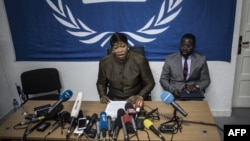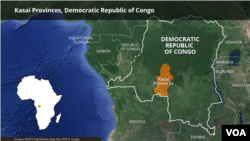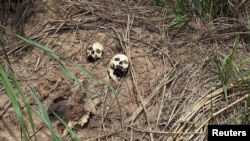The allegations in the DRC are horrendous: mass rapes, mutilations and beheadings.
If proven, such atrocities could constitute war crimes and crimes against humanity, said Bacre Waly Ndiaye, the leader of a United Nations team investigating violence in the Democratic Republic of the Congo's Kasai province.
Two years of fighting there between the army and two opposing militias have left up to 5,000 people dead, displaced 1.4 million and sent 30,000 fleeing to neighboring Angola.
But Ndiaye emphasized to VOA that such horrific acts still fall short of genocide, which must include a proven intent to wipe out an entire ethnic, national, racial or religious group.
Ndiaye's point follows remarks by the U.N.'s special rapporteur on torture worldwide, Nils Melzer, who recently suggested that conditions in the central African country were fast approaching those that led to genocide more than 20 years ago in Rwanda and the Balkans.
"My greatest concern is that what we are witnessing today may be only the prelude of what is still to come," Melzer told the Reuters news service last month.
Ndiaye and others working with the U.N. Human Rights Council have collected graphic and unsettling evidence testimony from survivors and witness to the violence. Their eight-month investigation found all armed groups guilty of mass atrocities.
But Ndiaye and other observers say there is not enough evidence to link individual acts of violence or even massacres to the focused intent to eliminate an entire ethnic group.
Seeking solutions
The international community is looking for ways to end the conflict.
The U.N. high commissioner for human rights, Zeid Ra'ad Al Hussein, in a July statement about the country's "deteriorating situation," urged "much stronger efforts to hold the perpetrators of violations responsible. The perpetrators of conflict-related sexual violence must also be held to account even, and perhaps especially, when they are agents of the State."
Ndiaye agrees, saying an end to the violence requires an end to impunity.
The team's findings "are in the hands of the high commissioner, so it's possible to prosecute," he said. "But there will never be enough courts or resources to prosecute thousands of perpetrators."
Longtime President Joseph Kabila's administration wants international support to improve the civilian court system widely seen as understaffed and dysfunctional but meanwhile is using military courts to try the accused.
Target prominent perpetrators
Ndiaye said it's impossible to try everyone accused of atrocities. Instead, he said the international community and the government should establish a policy that "would target individuals whose trial [would] be emblematic enough to have impact on deep-rooted impunity" and "include those who played a leadership role, be it within the militias or the security forces."
Human rights activists say the government has been slow to bring perpetrators to justice in Kasai, an opposition stronghold. Kabila has denied the accusation.
"I demand justice be done that no one … involved in this tragedy be spared from accountability," Kabila said in announcing a judicial inquiry in April 2017.
Alan Ngari, a senior researcher with the Transnational Threats and International Crime Division at the Institute for Security Studies in Pretoria, South Africa, questioned whether politics might be behind the Congo government's response.
"It almost feels," he said, "like [the government is saying] let part of the country fester. As long as [authorities] can continue to get popular support from other regions, that is fine and we will continue on with the elections later this year."
Elections, delayed since late 2016, are scheduled for December 23.
Peace talks encouraged
Besides taking legal action, Ngari said the government must begin talking with opponents in Kasai. It also must take responsibility for mishandling local issues involving customary leaders and introduce ways to resolve disputes without the use of deadly force.
He urged a reconciliation process that looks at the root causes of the violence, disarms militias and reintegrates child soldiers. He also recommends compensation and support to victims of rape, the internally displaced and those who have fled to neighboring countries. Investigations must continue into abuses by all armed forces, including the military.
The U.N. is naming two experts to study the details and conclusions of Ndiaye's team, which assessed the situation in DRC. They will offer proposals on specific actions that the government, U.N. agencies and donors can take to end the violence in Kasai.
Conflict's evolution
The conflict involves the army and two opposing militias: the Kamuina Nsapu, whose members come largely from the Luba ethnic group, and the Bana Mura, composed of Chokwe, Pende and Tetela fighters.
Tensions started two years ago, when the Congolese government overruled the Bajila Kasanga administrative unit over traditional authority in several villages in Kasai-Central province.
Kabila's administration opposed naming a popular Luba, Jean-Prince Pandi, as the customary chief. Pandi was suspected of links to the country's political opposition.
Pandi was killed by security forces in August 2016, and violence erupted. His militia, the Kamuina Nsapu, rapidly expanded its rebellion against the government and its supporters.
The government's supporters in turn formed the Bana Mura and other militias to crack down on the uprising, which spread to Kasai's other provinces.






